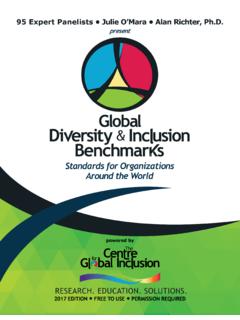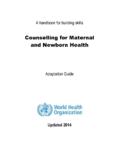Transcription of And the Two Become One: a Resource on Church Mergers
1 AND THE AND THE AND THE AND THE TWO TWO TWO TWO SHALL Become SHALL Become SHALL Become SHALL Become ONEONEONEONE Rev. Dr. Mariko Yanagihara A Resource on Church Mergers AND THE TWO SHALL Become ONE Rev. Dr. Mariko Yanagihara Produced for the Small Church and Community Ministry Office Evangelism and Church Growth Presbyterian Church ( ) Copyright 2008 Presbyterian Church ( ), Louisville, KY. All rights reserved. - 1 - A vibrant Korean American congregation merges with a predominantly White Church , which once flour-ished in the 50 s, but is now facing decline.
2 Two White churches merge, seeking to minimize cost and maximize ministry potential. A predominantly White Church merges with a much smaller Japanese American Church that needed to move out of their old neighborhood. Are Church Mergers the solution to congregations facing financial, ministry or property concerns? Can a merged Church attract new people? Will our new Church reflect the composition of the former churches, or will there be different people involved? When I first began to study Church Mergers , I was quite skeptical. Would churches be able to let go of their control in order to Become a new Church , or would the two groups be forever arguing about who is right and who is wrong?
3 Is it possible for churches to move from an us and them to a we ? Since the time I first began to ask these questions, I have had the opportunity to study Church Mergers , and serve as a pastor in a merged Church for over two years. I ve learned first hand that Church Mergers are not for the faint-hearted. Most churches are not aware of their own unique identity and Church culture until there is a merger. After merger, congregations discover that the way things have always been done is not the way the other Church has functioned.
4 Things that are sacred to one group may not even be known to the other. There is a mistaken assumption that all Christians will automatically love one another because we are one in Christ. Many faithful people enter into Mergers expecting to be one big happy family, only to be disappointed that the people from the other Church have different ideas of how family should func-tion. If you are considering a merger, or in the midst of a merger, expect that giving birth to this new life to-gether is not without pain and frustration. Some members will leave.
5 Leadership often changes. Sharing decision making and compromising on certain issues are not easy tasks. Intentional relationship building takes time. Finding ways to clearly communicate with one another involves trial and error. It will take several years before a new congregational culture will take hold. I have come to the conclusion that Church Mergers are a lot of hard work, but they can produce fruitful results. Church Mergers shouldn t be viewed as last ditch efforts but as viable possibilities for congre-gations tired of the status quo. A merged congregation can generate new life and energy toward spread-ing the message of Jesus Christ.
6 Successful Mergers only happen when everyone involved is willing to let go of their former identities and control and allow God to help reshape and form them into a new Church . The new Church may not be what people expected, but it will be the result of our faithfulness and commitment. So if anyone is in Christ, there is a new creation; everything old has passed away; see everything has be-come new! (2 Corinthians 5:17 NRSV) - 2 - IS Church MERGER RIGHT FOR US? Before jumping into a merger, each congregation needs to take a hard look at who they are and what vision(s) they have for themselves as a Church .
7 The congregations also need to assess their motivation, readiness, willingness and suitability for a merger. All alternatives to merging should be explored. The churches considering a merger need to find out if they will be compatible. Each congregation has its own unique congregational culture and that includes, but is not limited to areas of worship, theol-ogy, leadership, views on women s roles in the Church , use of space and time. I have listed some questions below that will help you get started in your discernment process. It is im-portant to involve your Presbytery staff or representative early in the process.
8 Who are we now? What is our history as a Church ? What hopes, dreams and visions do we have? What are our strengths and weaknesses? What is our financial situation? What assets do we have? What is our current attendance at worship? At other Church related events? Have we experienced growth or decline over the years? What has this growth or decline been attributed to? Does our Church reflect the composition of the surrounding community? Why do we want to consider a merger? Are we dissatisfied with the status quo? Do we have resources and gifts that we want to share or receive from another Church ?
9 Can our mission goals be accomplished better with another Church than alone? Can we reach new people that don t necessarily reflect our current composition? Are we interested in outreach and potential growth? What characteristics do we have that would contribute to a successful merger? Are we willing to take risks and be open to change? Can we share power, leadership and decision-making? Are we spiritually and financially healthy? Can we be patient, flexible, and willing to compromise? Are we willing to form new relationships? Do we have enough time and energy to devote to the merger?
10 Do we have a commitment to grow both spiritually and numerically? Are the pastors engaged and supportive of the merger? Are they willing to work as colleagues? Are we willing to accept the other pastor or a pastor not known to either congregation after our Church merger? Are we willing to accept any fallout from the merger? Are we open to learning and working together with people who are racially and culturally different than we are? Are we open to identifying and working on common mission goals with the other Church ? Do we have a willingness to reach people in the community who do not necessarily reflect the cur-rent composition of the Church ?




